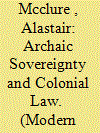|
|
|
Sort Order |
|
|
|
Items / Page
|
|
|
|
|
|
|
| Srl | Item |
| 1 |
ID:
174138


|
|
|
|
|
| Summary/Abstract |
The judicial and summary punishment of whipping—absent from the Indian Penal Code (IPC) of 1860—was passed into law through Act No. VI of 1864. This legislation, tacked on as an appendage to the IPC, invested the judge with wider discretionary powers to administer violence across Indian society. In this case what emerged was an evolving attempt to enlarge the colonial state's capacity for quotidian violence, targeting certain bodies to reaffirm, manage, and police the social hierarchies upon which colonial sovereignty depended. In the context of a slow imperial movement away from the cast-iron distinctions that had been made between groups in the early nineteenth century—distinctions that had, among other things, supported a legally enforced system of slavery—new methods to mark the value of different bodies were created. The events of the 1850s, in particular the rebellion of 1857–1858, saw the re-emergence of the colonial idea that certain bodies could withstand violence, and that violence itself could be used to create economically productive colonial societies, in debates around penal law and punishment. This article will trace this history through formal legal restrictions and informal legal-cultural practices in relation to corporal punishment in colonial India. Over the course of the period under study, this legislation introduced into law what one official termed ‘the category of the “whippable”’.1 Charting the changing shape of this legal category along lines of race, gender, caste, class, and age, the article will argue that a logic of exceptionality, channelled here through the application of judicial violence, attempted to structure and manage Indian society in complicated ways.
|
|
|
|
|
|
|
|
|
|
|
|
|
|
|
|
| 2 |
ID:
126653


|
|
|
|
|
| Publication |
2013.
|
| Summary/Abstract |
As Professor Ian Brown's recent work on the colonial prison in British Burma has shown, the proportion of the population convicted of crimes was routinely and markedly higher than in any other province of British India. Part of the explanation for the exceptionally high figures may be the colonial criminalization of practices that were previously lawful. Gambling was one such activity that the British, at least according to their rhetoric, were intent on prohibiting as part of their 'civilizing mission'. However, in practice colonial law was more ambiguous and equivocal. Government prosecutors and judges disputed the definition of gambling and struggled to differentiate it from other tolerated practices. Beyond these legal difficulties, individual British officials often found it necessary to turn a blind eye to gambling. On an everyday level, subordinate officials in the police and magistracy had an ambivalent relationship with gambling. Although empowered to suppress it, some chose to ignore its presence and others still were actively conniving with it. By studying how the British sought to control gambling in the colony at the turn of the twentieth century, this article seeks to restore the full complexity to the history of criminality in colonial Burma.
|
|
|
|
|
|
|
|
|
|
|
|
|
|
|
|
| 3 |
ID:
123500


|
|
|
|
|
| Publication |
2013.
|
| Summary/Abstract |
The paper investigates how political processes shape the institutional arrangements and then affect performance of Indigenous irrigation systems. External interventions in the form of coercive authority and new rules resulted in a shift of resource governance from farmers to state officials in state-administered areas of Pakistani Punjab during British rule. The primary farm-level data were collected from 280 spate irrigation farmers from four systems. The analysis of systems-level agricultural production and institutional performance indicators of irrigation systems in identical environments is conducted. We examined Elinor Ostrom's Design Principles that characterise long-enduring, self-governing resource systems to compare robustness of tribal and state-administered area spate irrigation institutions. The state intervention in Indigenous irrigation systems weakened collective action and distorted equity in access to customary irrigation rights in state-administered areas. The study concludes that tribal areas systems working without state intervention have evolved effective local irrigation management institutions based on social and ecological values to ensure sustainable self-governing resource regimes.
|
|
|
|
|
|
|
|
|
|
|
|
|
|
|
|
|
|
|
|
|